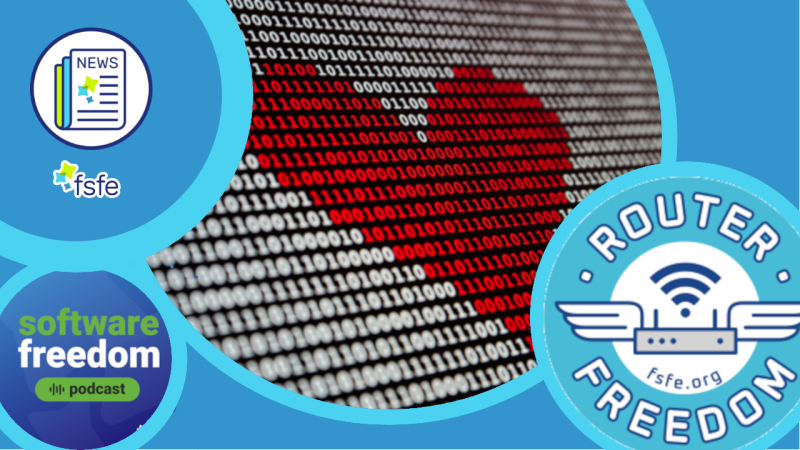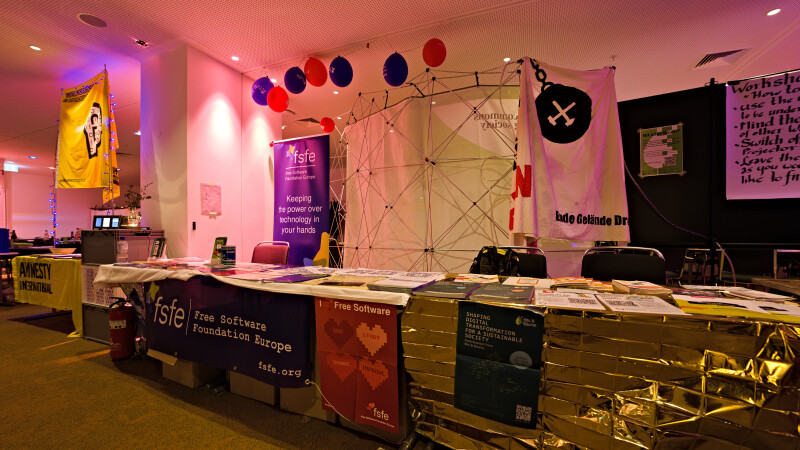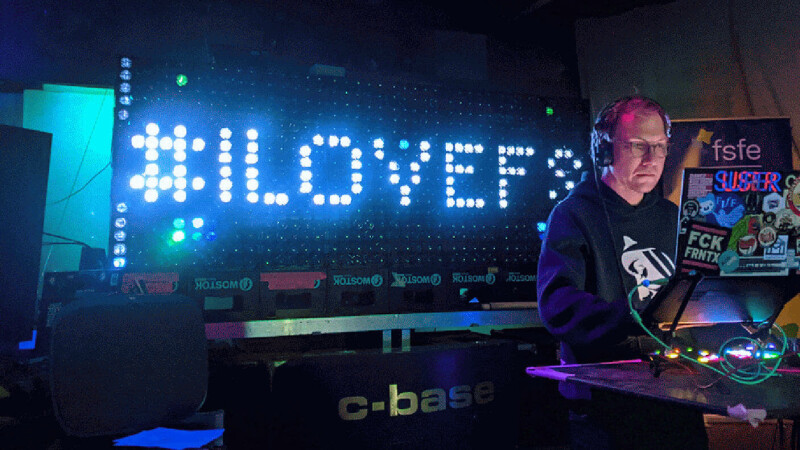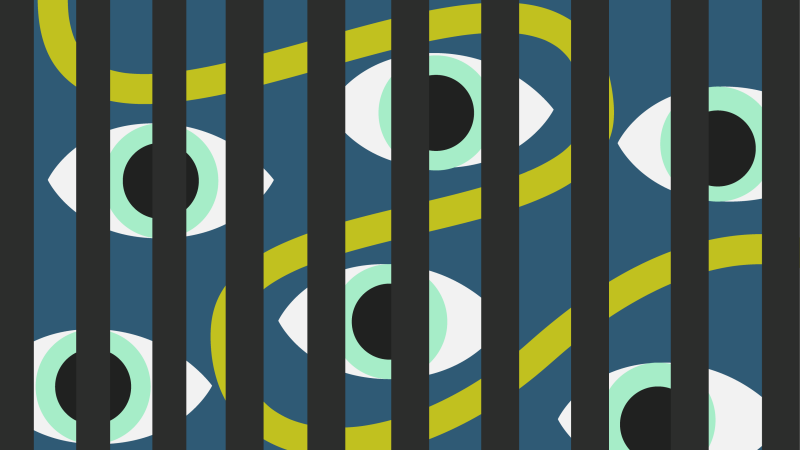Podcast episodes +++ Router Freedom tech wiki +++ Become our policy intern
mardi 16 janvier 2024 à 00:00Podcast episodes +++ Router Freedom tech wiki +++ Become our policy intern
We are starting 2024 with a lot of energy, looking for a policy intern and with great news: two new SFP episodes, the Router Freedom tech wiki, the ‘Ada & Zangemann’ ebook is free of charge in French, and we are looking forward to celebrating ‘I Love Free Software Day’ on 14 February!

Table of contents
- Software Freedom Podcast: Listen to our episodes about ‘What is Free Software’ and ‘Public Money? Public Code!’
- Router Freedom: Good news: our tech wiki is now online! Bad news: Austria goes against Router Freedom
- Spread the Word! We are looking for a policy intern
- Unblocking User Freedom: The right to use adblockers
- ‘Ada & Zangemann’: What pupils write about proprietary software and why it motivates the author
- Italian Community Meeting 2023
- Get Involved: I Love Free Software Day
- Quote of the Month
- Contribute to our Newsletter
Software Freedom Podcast: Listen to our episodes about ‘What is Free Software’ and ‘Public Money? Public Code!’
During the past weeks we published two new episodes of our Software Freedom Podcast!
In our episode number 23, some FSFE staffers play a guessing game with terms related to Free Software. This is the perfect episode for you to learn more about it and get a better understanding of some terms that you might not use daily.
Before that, we talked with Johannes Näder, Senior Policy Project Manager at the Free Software Foundation Europe (FSFE), about "Public Money? Public Code!", in our 22nd episode.
Router Freedom: Good news: our tech wiki is now online! Bad news: Austria goes against Router Freedom
Have you ever thought about installing your own router but never had the chance to learn how to do it? Now you can with our Router Freedom tech wiki, which provides information on the necessary steps you need to use to connect your own router! With the help of our team of volunteers from the Netherlands, you can check all the necessary steps to start using your own home router. Our policy and advocacy work continues, notwithstanding some regulatory hurdles. The Austrian Regulatory Authority for Broadcasting and Telecommunications decided not to regulate the network operators with regard to Router Freedom, allowing Internet Service Providers (ISPs) to impose their equipment on consumers. We will continue to seek alternative ways to promote Router Freedom in the country.
Spread the Word! We are looking for a policy intern
The FSFE team is looking for a motivated intern to support the FSFE’s policy activities and contribute to our work to empower people to control technology. The person will work 35 hours per week with our team in the FSFE Berlin office for a period of six months.
"I joined FSFE as an intern in March 2023 because I have always been interested in European politics and because the slogan "Public Money? Public Code!" resonated deeply with my beliefs. The experience at FSFE has been great: I learned how to make our voice heard and I am proud of being part of a community of many amazing people working and volunteering for software freedom.” - Dario Presutti, former policy intern
Unblocking User Freedom: The right to use adblockers
Companies increasingly aim to control how users interact with their content online, threatening user freedom. As more companies crack down on browser extensions and other third-party software used by internet users to customise their experiences, two recent German court cases on adblockers could strengthen the legal case for user control over technology.
Interesting? Read our news item to find out more about this topic.
"Ada & Zangemann": What pupils write about proprietary software and why it motivates the author
Pupils all over the world are learning about the story of "Ada & Zangemann - A Tale of Software, Skateboards and Raspberry Ice Cream": it is encouraging to see how new generations are inspired to start coding and to write to Zangemann about his behaviour. Check out this message from our president, Matthias Kirschner, to our readers.
The story of "Ada & Zangemann" is now available in French and, thanks to the French Ministry of Education, you can download the ebook free of charge at https://cfeditions.com/ada(FR). And if you want to read the story about how this book was translated into French by some students, do not forget to read the quote there (FR) from Alexis Kauffmann, head of the Free Software and educational resources project at the Ministry of Education and Youth and founder of Framasoft.
Italian Community Meeting 2023
More than 20 volunteers and associations' members from all over Italy, online and in person, gathered in Bolzano for the Italian Community Meeting during SFSCON 2023 to discuss the future of Free Software in Italy. You can enjoy the recording of the workshop in our Peertube Channel.
A sneak peek at the main topics discussed by our participants: Free Software in schools, the creation of a toolkit which can be adopted by all organizations to encourage the use of Free Software, and raising awareness about Free Software with the general public through simplified information!
Get Involved: I Love Free Software Day
On 14 February, we gather to celebrate "I Love Free Software Day". Join our local groups' events on that date, organise your own gathering, and/or send a message to thank the contributors of the Free Software project you really like.
For “I Love Free Software Day 2024: Forging the future with Free Software”, we want to focus on engaging young generations in Free Software as they are the ones who will shape the next years. For more information, ideas, and inspiration check out the 'I Love Free Software' activity page!.
Quote of the Month
“Dear Zangemann, I used to like your inventions in fact I still like them but you are starting to use them in the wrong way. It’s not fair that some people have to eat, drink and listen to music they don’t like. When you do that to people can see you inside and how selfish you are. It’s much better if you share your inventions because it doesn’t mean they are stealing it, it means they just are borrowing it, and making it better. So please share your ideas. It will make our planet much better.”
— Nikita (from one of the letters sent to Zangemann)
Contribute to our Newsletter
We would love to hear from you. If you have any thoughts, pictures, or news to share, please send them to us at newsletter@fsfe.org. You can also support us, contribute to our work, and join our community. We would like to thank our community and all the volunteers, supporters, and donors who make our work possible, with a special mention to our translators who make it possible for you to read this newsletter in your mother tongue.
Your editors, Ana and Tommi


 CC-BY-NC-SA by
CC-BY-NC-SA by